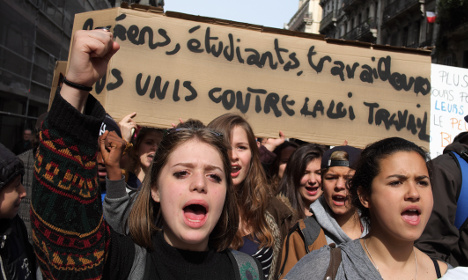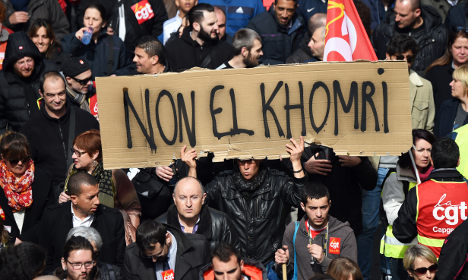Thousands of French high school students and workers protested against labour reforms Wednesday, heaping pressure on President Francois Hollande's already unpopular and fractured Socialist government with presidential elections looming in 14 months.
Teenagers and students threw eggs and firecrackers as they marched in Paris chanting slogans such as “El Khomri, you're beat, the youth are in the street” in reference to Labour Minister Myriam El Khomri.

The youth are among the most vocal demonstrators against reforms they fear will make their future more uncertain, even as the government vows that the changes are in their favour.
Dozens of schools were blocked as protests took place around the country, compounded by a rail strike for better working conditions that left many commuters stranded.
France's government has faced massive pushback – including from within its ranks – over the proposals that would give bosses more flexibility in hiring and firing.
“This law is absurd: night work, abusive firings… it is distressing to see this, especially from the Socialists,” said Lucie Ferreira, 21, an IT student.

The reforms aim to bring down a record 10.2-percent unemployment rate, with youth joblessness more than twice that. The proposed new law also cuts overtime pay for work beyond 35 hours – the working week famously introduced in the 1990s in an earlier Socialist bid to boost employment. In some sectors, young apprentices could work 40 hours a week.
“Like many students I work to pay for my studies. This law will prevent me from limiting my work hours,” said Flora, 20, a history student protesting at the Place de la Republique in Paris. “When will I have time to study? This law is completely irrational. In reality, nobody really works 35 hours a week anymore, it is 40 or more to make a living. How much will it end up being with this law?”
An online petition against the draft law has attracted more than a million signatures, while a poll showed seven in 10 people were opposed to the planned changes.

Hollande, who campaigned on a promise to improve prospects for young people, said on the eve of the protests that he wanted to help them “have more job stability”, adding: “We must also give companies the opportunity to recruit more, to give job security to young people throughout their lives, and to provide flexibility for companies.”
Prime Minister Manuel Valls on Monday kicked off three days of talks with unions in a bid to salvage the law, after the chorus of opposition derailed a plan to submit the proposals to the cabinet this week.
The turmoil created by the proposals has struck yet another blow to Hollande and Valls, who have come under attack from leading members of the Socialist party for being too pro-business and shifting to the right. Whether over economic reforms or plans to strip convicted terrorists of their nationality, the government has faced howls of protest from the left flank of the party at almost every turn.
'Don't be afraid of change'
Those backing the reforms believe they are essential to reviving a stagnant economy, creating jobs and remaining competitive, and El Khomri has argued that much of the opposition to her law is the result of misinformation and false rumours.

Outspoken Economy Minister Emmanuel Macron told French radio on Tuesday that unemployment had not dropped below seven percent in 30 years. “Have we tried everything? Let us look outside France. What has happened elsewhere? They have all evolved, they have all done things,” he said.
Italian Prime Minister Matteo Renzi, whose country has adopted similar reforms – as have Spain and Britain – said on Tuesday after talks in Venice with Hollande that the French “should not be afraid of change.”
French employers are reluctant to take on permanent workers because of obstacles to laying them off in lean times. Young people leaving university find themselves working temporary contracts for years at a time or doing internship after internship while hoping to secure a job.

Along with tweaks to working hours, the reforms identify precise conditions such as falling orders or sales, or operating losses, as sufficient cause for shedding staff. However those protesting do not believe the proposed reforms will improve their prospects.
“Young? Yes, Stupid? Maybe. Slaves? Never” read one poster in Rennes where local government officials said some 4,500 protested. In Toulouse police estimated a crowd of 10,000.




 Please whitelist us to continue reading.
Please whitelist us to continue reading.
Member comments